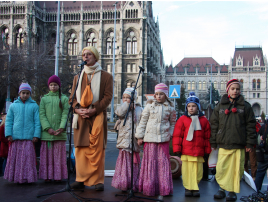ISKCON Retains Its Religious Status in Hungary
By Krishna-lila Dasi (Krisztina Danka) | Feb 28, 2012

On February 27, 2012, the Hungarian Parliament voted on the amendment to the new religious law, adding 18 religious organizations to the list of fully recognized churches in Hungary. Among others, the new list includes well-established Christian groups (such as the Methodists, Anglicans, Adventists, Mormons), the Jehovah Witnesses, representatives of other Eastern world religions (2 Muslim groups, 5 Buddhist communities and the Hungarian Society for Krishna Consciousness).
As ISKCON News reported earlier, in July 2011, the Hungarian Parliament introduced a new religious law, which – except for 14 religious organizations – stripped over 300 religious groups of their previously acquired status, requiring them to re-register under stringent new conditions. The automatically-accepted 14 only included major Christian and Jewish groups but none of the smaller Protestant churches or representatives of Eastern world religions.
The law received a great deal of criticism both nationally and internationally from many religious and human rights organizations; from the European Union, the European Council, the US State Department, and other countries` diplomats.
Since ISKCON Hungary was among those slated to lose their status, as well as its 270 hectares of land at the New Vraja Dhama farm as of January 1st, 2012, Indian diplomats, dozens of scholars of Hinduism, international Hindu organizations, as well as over fifty thousand individuals, expressed their concerns to the Government of Hungary, asking Prime Minister Viktor Orban to protect ISKCON`s land and provide fully recognized status to the representatives of Hinduism in Hungary. To protect their lands, sacred cows, families and basic human rights, on December 12, 2011, the Hungarian Krishna devotees protested with cows from the Krishna Valley farm in front of the Parliament building, which drew extensive national and international media attention.
On December 19, 2011, Hungary`s Constitutional Court annulled the law, since it did not meet some formal technical requirements. However, a few days later it was voted in again, with no major changes to the previous version. But it prolonged the church status of ISKCON and 81 other religious organizations until the end of February 2012, by which date they needed to present documents proving that they met all the requirements. If they did so, with the Parliament`s approval, they would be allowed to continue to exist as fully recognized churches without interruption. These requirements were: to have a bona fide theology, to have existed in Hungary for at least 20 years, or have international importance. Out of the 82 organizations, 32 met these requirements; and on the 27th of February, the 2/3 government majority in the Parliament gave recognition to 18 of them, including the Hungarian Society for Krishna Consciousness.
Although the remaining religious organizations have the right to re-apply for church status in 2013, the Parliament did not provide any reason why the remaining 24 organizations meeting the formal requirements would not get recognized.
According to the recent press release of the Hungarian Society for Krishna Consciousness, it is “a great relief” that after many months of uncertainty, finally, the group can concentrate on actual service to society, which is to provide spiritual education and to care for the needy. In the meantime, members have also expressed their concern for the rights of those religious organizations that were denied approval without explanation.
Sivarama Swami, the spiritual leader of ISKCON Hungary, expresses his heartfelt gratitude to all those organizations and individuals who helped the Hungarian devotees during these difficult times.















